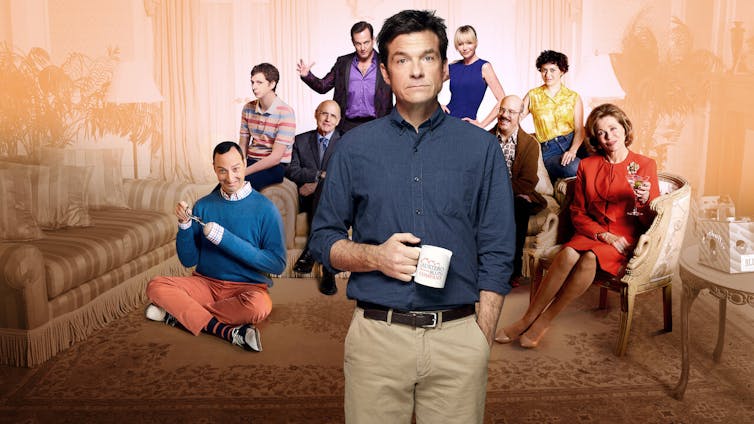
In early February, fans tuned in to Network 10 expecting to see the new season of South Park. Instead, they saw re-runs. Were South Park co-creators Matt Stone and Trey Parker trolling fans with a fake new season or was this yet another familiar experience of lagging release schedules for Australian viewers?
It was the latter.
Australian TV audiences are no strangers to the idea of having to wait for content. Researchers Ramon Lobato and James Meese, writing in 2016, found Australians were “second class media citizens” who had been “frustrated by the high cost and slow delivery of first-release TV and movies from the United States.”
Australians are yet to see the new seasons of American Dad or Family Guy on-demand, despite both airing in America in recent months. And while Peaky Blinders most recent season has been airing in the UK since February, there’s still no announced release for Australian Netflix.
Streaming was meant to simplify this landscape and allow for content to arrive quicker.
Licensing confusion
Rights for shows are broken down into different types. Airing a TV show by linear broadcast (traditional television) requires licensing the broadcast rights while making the show available for non-linear streaming requires licensing the streaming rights.
Often, broadcast rights include a window of exclusivity for the television broadcaster before the content can be made available on a streaming platform – otherwise why would anyone watch the broadcast?
Australians and many avid fans around the world are dealing with the fallout of complex licensing agreements across media conglomerates, streamers, and broadcasters that are delaying, and sometimes even removing, their favourite shows.
In 2020, after 23 years as the Australian broadcast home of South Park, SBS made the decision not to renew their first-run broadcast rights, with 10 Shake set to become the new Australian home of the show. South Park’s 2020 pandemic special was “fast-tracked” to 10 Shake, arriving only a few hours after the US broadcast.
The 25th Season of South Park, released in the US on February 2nd this year was expected to follow suit and air on 10 Shake in the first week of February, but re-runs played instead.
To try and clear up the confusion, Paramount+’s Australian Twitter account tweeted that, for streaming the new season, the first two episodes would come out February 25th on Australian Paramount+.
“Due to regional digital licensing restrictions, some content isn’t available in Australia at the same time it is in the USA,” said the tweet, something that most Australians need no reminding of. The Paramount+ airdate of the 25th for the first two episodes was some time after the February 2nd premiere in America. Episodes 3 and 4 followed on March 4. 10 Shake eventually broadcast new episodes from February 24 onwards.
As the Australian streaming rights to the new season of South Park are held by Paramount+ and 10 holds the broadcast rights (and as, anyway, both companies are owned by ViacomCBS) Australians are left wondering - why the delay?
The arrival of streaming platforms hasn’t been the silver bullet to solve timely release of content, as licensing deals and the oddities of broadcast and streaming rights agreements have seen confusing consequences for Australian audiences.
We’ve been here before
South Park’s 25th season isn’t the first time that a gulf between streaming and broadcast rights has left Australians in a lurch – it’s a common occurrence in the an industry where rights are constantly renegotiated around legacy and new media providers. Australians were thrown a similar curve ball with the fifth season of Netflix original Arrested Development in 2018.
Netflix’s fourth season of the show had released in 2013, before Netflix was available in Australia. As a result, Netflix had sold off first-run broadcast rights to Fox. Yet come 2018, with Netflix now available in Australia, Australians were forced to go to Foxtel for the release of a high-profile Netflix Original. The strange licensing agreement had allowed Foxtel broadcast rights and a short on-demand window for future seasons, and kept the Netflix show off Netflix for some time.
Disney’s purchase of Fox in 2019 later saw the ownership of the first three seasons transfer to Disney, arriving on Disney+ in 2021. Later that year Arrested Development’s last two seasons left Netflix and are no longer available for Australians on any platform.
The weird oddities of licensing and rights deals can come back to bite consumers. Much as Netflix’s own Arrested Development seasons suddenly vanished from Australian Netflix, an old licensing deal will see a number of Disney movies vanish from Disney+ and return to Netflix in 2026 despite those titles leaving Netflix in 2019.

What happens when we can’t watch our favourite content?
Before streaming kicked off in the country, Australians were used to delayed release times on their favourite content. In 2014, this frustration combined with Game of Thrones hype drove Australians to be world leaders in digital piracy. Conventional wisdom suggested this problem could be fixed by the arrival of the dozen streaming platforms in the years since and the ability they brought for instant content access. With so many platforms, how could you ever not find the content you wanted?
However, the confusing web of rights has allowed for just as much uncertainty. Despite Australians having so many streaming platforms, different types of rights and licensing deals mean Australians waited weeks for some new South Park, which is now finally broadcasting on 10Shake and streaming on Paramount+.
Oliver Eklund owns shares in Disney, Netflix, and Apple.
This article was originally published on The Conversation. Read the original article.







